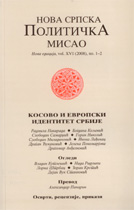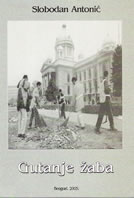| NSPM in English | |||
Without winners and lossers: Serbia's may elections |
 |
 |
 |
| среда, 14. мај 2008. | |
|
Despite the very good placement of “For European Serbia“ coalition, it comes out of these elections only as a relative winner. In order to be able to form a government it needs the backup of the socialists, whose political program is actually much closer to other political parties, especially DSS. In some aspects their program is even more radical then the program of the Radical Party. In a situation without any clear winners and losers – apart from the socialists, without whom no government can be formed – it remains to be seen who comes up first with the necessary majority in the parliament. The stakes are higher, however, that it might be the radicals, with the Democratic Party of Serbia and the Socialists. Serbia 's May elections, therefore, can hardly be defined as a referendum, let alone a referendum on which Serbia completely turned to Europe and the US and gave up Kosovo. Political mathematics is simple. Even more than before Serbia remains a deeply divided and polarized society, in which there are still more of those who consider Kosovo to be the most important issue. The point, however, is not that Serbia is – or at least not willingly – making a choice between the East and the West, since practically all players agree that Serbia needs to cooperate with both Europe and Russia , and that its natural position is between the East and the West. The question of strong differences is one of priorities: parties gathered around the “For European Serbia“ coalition and LDP emphasize that Serbia's accession to the EU is their primary objective at any cost, while on the other hand, the SRS and DSS give priority to the issue of preserving Serbia's territorial integrity and Kosovo within Serbia. Different views on the Kosovo policy and questions such as what measures to be taken against countries that have recognized Kosovo's independence and whether Serbia should immediately take legal action before the International Court of Justice were also the reasons for the downfall of the government in March and explain why it is impossible for DS and DSS to form a new government together. This further implies that what used to be called the “democratic bloc “ in Serbia does not exist any more. On the other hand, and in spite of great political differences, the division between “democrats“ and “non-democrats“ does not have a signifier in reality anymore. All Serbian political parties today play in accordance with contemporary democratic rules. Moreover, Serbia 's greatest success in the last few years in the process of growing democratization is the very political reality in which there are no more anti-system parties. Today's Serbia and all its political players represent the democratic bloc. Serbia 's last test will be to understand that transition of power is normal in a democratic country and that this is one of the greatest democratic achievements. This would mark the final stage in Serbia 's process of transition, and is especially important in the current situation in which the will of the people will be split between support for the future government and a strong opposition. For this reason, the need for a political dialogue comes as a must for political stability within Serbia . When Serbia recognizes its own existing democracy in a contemporary society, it will be the last stage of its successful transition – and a democracy par excellence . Bogdana Koljević is a political philosopher and researcher at the Institute for Political Studies in Belgrade and an editor of journal for political theory and social analyses “New Serbian Political Thought”. |
Остали чланци у рубрици
- Playing With Fire in Ukraine
- Kosovo as a res extra commercium and the alchemy of colonization
- The Balkans XX years after NATO aggression: the case of the Republic of Srpska – past, present and future
- Из архиве - Remarks Before the Foreign Affairs Committee of the European Parliament
- Dysfunction in the Balkans - Can the Post-Yugoslav Settlement Survive?
- Serbia’s latest would-be savior is a modernizer, a strongman - or both
- Why the Ukraine Crisis Is the West’s Fault
- The Ghosts of World War I Circle over Ukraine
- Nato's action plan in Ukraine is right out of Dr Strangelove
- Why Yanukovych Said No to Europe

.jpg)








 On May 11th 2008 Serbia held parliamentary and local elections. The elections were democratic and run in a proper manner, which, however, cannot be said for the predominantly negative campaigns and political atmosphere in which the elections were held. The turnout of over 4 million voters was anticipated, but the placement and results of parties differed in a few significant ways from political and public expectations. The first-placed coalition ”for European Serbia“ gained support from 38.8% of citizens, while the Serbian Radical Party received 29.2%. The coalition of the Democratic Party of Serbia and New Serbia won 11.3%, followed by an outstanding and most surprising result of 7.5% for the Socialist Party of Serbia, and Liberal Democratic Party, that barely passed the threshold (5.3%). The results on the local level pretty much followed the trend of positioning in the parliament, thus confirming that Serbia is almost symetrically divided between two main lines of political thinking.
On May 11th 2008 Serbia held parliamentary and local elections. The elections were democratic and run in a proper manner, which, however, cannot be said for the predominantly negative campaigns and political atmosphere in which the elections were held. The turnout of over 4 million voters was anticipated, but the placement and results of parties differed in a few significant ways from political and public expectations. The first-placed coalition ”for European Serbia“ gained support from 38.8% of citizens, while the Serbian Radical Party received 29.2%. The coalition of the Democratic Party of Serbia and New Serbia won 11.3%, followed by an outstanding and most surprising result of 7.5% for the Socialist Party of Serbia, and Liberal Democratic Party, that barely passed the threshold (5.3%). The results on the local level pretty much followed the trend of positioning in the parliament, thus confirming that Serbia is almost symetrically divided between two main lines of political thinking. 










